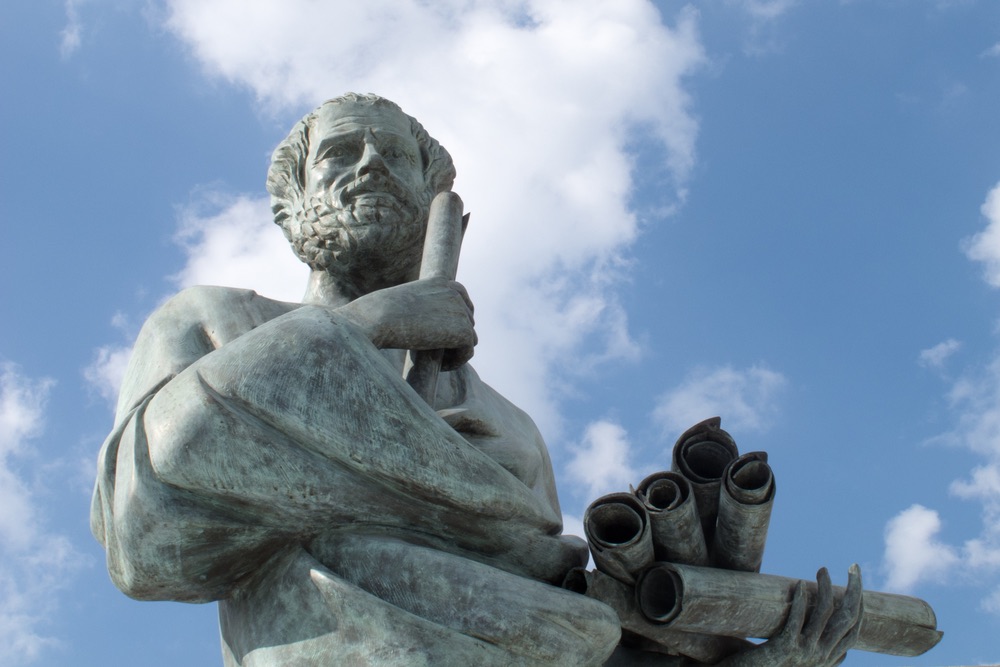Has Aristotle's Tomb Been Found? Archaeologists Doubt Claims

An archaeologist thinks he has found the tomb of Aristotle at Stagira, an ancient city where the Greek philosopher lived for much of his life.
But several other archaeologists say there is hardly enough evidence to link the tomb to Aristotle, and there's probably no way to confirm it either way. Even so, historical records do support the idea that Aristotle could be buried in the area.
Konstantinos Sismanidis, the archaeologist who discovered the tomb in question, has told media outlets that he cannot be certain that the structure is Aristotle's tomb. [Bones with Names: Long-Dead Bodies Archaeologists Have Identified]
Aristotle's ashes
Now retired, Sismanidis announced the possible discovery of Aristotle's tomb in a paper presented recently at the Aristotle 2,400 Years World Congress, which marks 2,400 years since Aristotle's birth. The tomb, he said, is a small building with an altar and marble floor, and this building is located next to a larger, semicircular structure that could have functioned as a gathering place for the people of the city.
"It's a public building, and it was constructed at the period of Alexander the Great," Sismanidis wrote in the summary of his presentation. Aristotle — who taught and wrote on a wide range of subjects, including logic, metaphysics, ethics, poetry and biology — was a tutor to Alexander.
Though ancient records say Aristotle died on the island of Euboea in 322 B.C., Sismanidis noted that Arabic copies of a text written by a historian named Ptolemy (who lived from A.D. 90 to 168) say Aristotle's ashes were brought to Stagira (also spelled Stageira), where they were interred in a building constructed in his honor.
No human remains or inscriptions mentioning Aristotle were discovered in the tomb at Stagira. Sismanidis first uncovered the building in 1996, and he has excavated at Stagira for more than 20 years. He plans to publish his findings this fall in a multivolume book, according to news reports.
Sign up for the Live Science daily newsletter now
Get the world’s most fascinating discoveries delivered straight to your inbox.
Skeptical reaction
Since the announcement last week, media outlets all over the world have reported on the discovery of the supposed tomb.
However, many of the archaeologists Live Science contacted expressed doubts about the discovery.
"I would be skeptical, especially after the so-called discovery of Alexander's tomb at Amphipolis," said R. Angus Smith, a professor at Brock University in St. Catharines, Ontario, who excavates in Greece. "It would be lovely if true, but I have not seen evidence to convince me of the connection."
In September 2014, some media outlets and archaeologists speculated that a tomb found at Amphipolis in Macedonia (a historical region of Greece; not to be confused with the modern country of Macedonia) belonged to Alexander himself. However, further investigation revealed evidence, including an inscription, that the tomb likely belonged to the Macedonian king's friend, Hephaestion. [Photos: Mysterious Ancient Tomb in Amphipolis]
"That the tomb found by Sismanidis at Stagira is that of Aristotle is a plausible suggestion but not a provable one, as the Greek archaeologist himself admits," said Jerome Pollitt, a professor of art history at Yale University. "Barring the discovery of an inscription, that state of affairs is unlikely to change."
Spencer Pope, a classical archaeologist at McMaster University in Ontario, commented that "while the tomb at Stagira dates to the time of Aristotle and has a seemingly commensurable monumentality with the ancient philosopher, further evidence linking it with a specific historical figure would be needed for a convincing attribution."
Perhaps the strongest reaction against Sismanidis' claim came from Edith Hall, a professor at the Centre for Hellenic Studies at King's College London.
"Call me a cynic, but has archaeologist Kostas Sismanidis really found a single shred of evidence that the tomb excavated in ancient Stageira long ago in 1996 houses the remains of Aristotle?" she wrote in a post on her blog. "Releasing the information in the 2,400th anniversary year of Aristotle's birth strikes me as a little too much of a coincidence," she added.
Sismanidis is not the first archaeologist who has claimed to have found Aristotle's tomb, Hall noted. In 1891, Charles Waldstein, an archaeologist at the American School of Archaeology of Athens, excavated a tomb at the site of Eretria that he claimed was Aristotle's. Waldstein claimed to have found writing instruments.
"Waldstein's 'tomb of Aristotle' is much nearer [to] the place where the actual ancient sources said the philosopher died," Hall wrote.
Voice of support
Although most archaeologists Live Science contacted were skeptical of Sismanidis' claim, one researcher did voice support. "It is most likely his [Aristotle's] tomb," said Elizabeth Kosmetatou, a professor of ancient history at the University of Illinois.
Kosmetatou told Live Science that she has heard that the structure uncovered by Sismanidis contains roof tiles stamped with Greek letters showing that they were produced at a royal workshop for pottery in Pella, the capital of ancient Macedonia. Those letters would indicate that the tomb and semicircular structure were public buildings that may have been financed by the city or the Kingdom of Macedonia.
Ptolemy claimed that Aristotle's tomb became a focal point for the city of Stagira, meaning that public gatherings likely would have taken place there, Kosmetatou said. The semicircular structure beside the tomb would have been a good place for such meetings or other public events, she noted.
"He's probably reliable," Kosmetatou said of the ancient historian, adding that just because Ptolemy's account survives only in Arabic doesn't mean it isn't accurate.
Still, Kosmetatou said there is no way to be sure that Aristotle's tomb has been discovered. "We don't have the time machine to go there," she said.
Original article on Live Science.

Owen Jarus is a regular contributor to Live Science who writes about archaeology and humans' past. He has also written for The Independent (UK), The Canadian Press (CP) and The Associated Press (AP), among others. Owen has a bachelor of arts degree from the University of Toronto and a journalism degree from Ryerson University.









